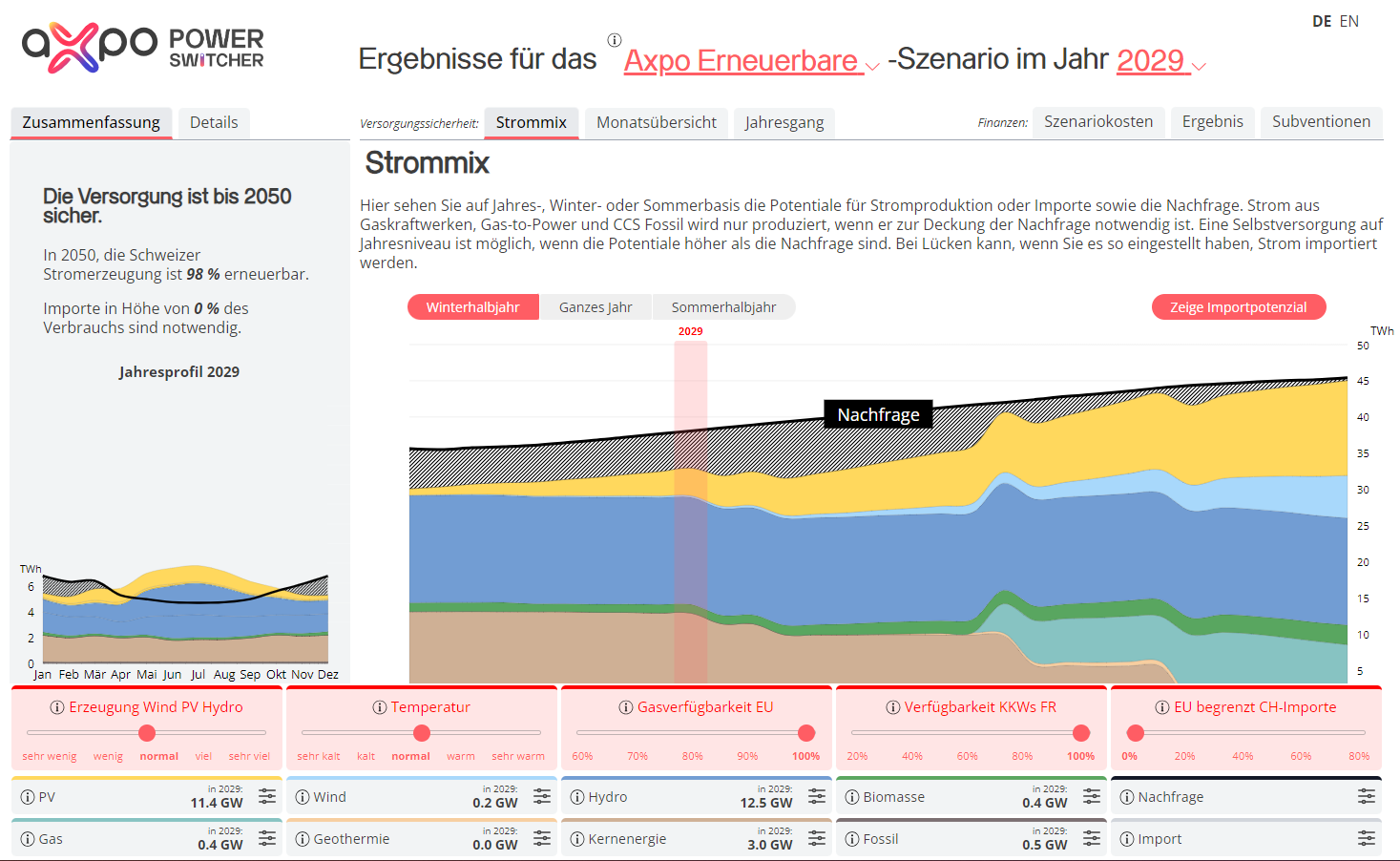

Energy Policy This is how Axpo positions itself on energy policy issues
Revision of the Energy Promotion Ordinance (management fee)
The proposed amendment to the regulation and adjustment to the management fee are not comprehensible. The effects of Swissgrid's new single-price mechanism for balancing energy are not yet foreseeable. Even under the new mechanism, the risk for all plant operators that balancing energy costs will exceed revenues cannot be ruled out.
- Statement Axpo Holding AG (German only) View Send email Download
Federal Act on Gas Supply
Axpo welcomes the draft Gas Supply Act. However, in order to ensure competition, the bill needs to be amended in certain areas. The requirement to install a smart meter as a prerequisite for network access must be waived, and the storage obligation must be assigned to the market area coordinator.
- Statement Axpo Holding AG (German only) View Send email Download
Regulatory changes to come into force on 1 July 2026
Axpo welcomes the quick implementation of a more market-oriented minimum remuneration for small PV systems. However, the relevant reference market price should be determined on an annual basis in order to provide the right incentives for feeding-in. In addition, minimum remuneration should be waived in periods of negative market prices.
- Statement Axpo Holding AG (German only) View Send email Download
Package "Stabilization and Further Development of Switzerland-EU Relations"
The electricity agreement between Switzerland and the EU aims to secure access to the European electricity market and enhance Switzerland's energy supply security. Axpo supports the agreement. However, numerous "Swiss finishes," where domestic regulations go significantly beyond the agreement, appear counterproductive.
- Statement Axpo Holding AG (German only) View Send email Download
Amendments to ordinances in the area of the SFOE: Energy Promotion Ordinance and the Energy Ordinance
With the amendment to the Energy Promotion Ordinance and the Energy Ordinance, the federal government plans to reduce the maximum contributions for the promotion of PV systems and to limit the compensation for ecological refurbishment measures at marginal power plants to the Swiss sovereign share. Axpo is of the opinion that these adjustments are not in line with the legislator's intentions and ultimately run counter to the energy policy objectives.
- Statement Axpo Holding AG (German only) View Send email Download
Amendment to the Federal Act on Subsidiary Financial Aid for the Rescue of Systemically Important Companies in the Electricity Sector (FiREG)
Axpo can understand the extension of the temporary FiREG (Federal Act on Subsidiary Financial Aid for the Rescue of System-Critical Companies in the Electricity Industry) in principle. However, the situation is different today due to adapted hedging strategies, new energy market rules and reduced volatility. The provision of a commitment credit in the amount of CHF 10 billion is therefore clearly too high. In addition, the calculation of the provision fee should be based on the market interest rate, the scope of application should be broadened and data queries should be limited to the actual purpose of the law.
- Statement Axpo Holding AG (German only) View Send email Download
Speeding up of the expansion and reinforcement of the electricity grids (amendment to the Ordinance on the Planning Approval Procedure for Electrical Installations)
Axpo welcomes the present amendment to the Ordinance on the Planning Approval Procedure in view of the necessary expansion of the electricity grids. However, the provisions should neither bring about significant changes nor lead to the desired speeding up of procedures in the grid sector.
- Statement Axpo Holding AG (German only) View Send email Download
Ordinance on the central management of electricity supply
The proposed measures represent a serious encroachment on constitutional rights. In the event of a severe electricity shortage, they can be justified - in return for full compensation. However, the compensation provided for in the draft on the basis of production costs does not appear to be constitutional.
- Statement Axpo Holding AG (German only) View Send email Download
Indirect counter-proposal to the popular initiative “Electricity for all at all times (stop blackout)”
Axpo welcomes the Federal Council's indirect counter-proposal and supports the postulated principle of technology neutrality. Lifting the ban on new build does not mean that new nuclear power plants will necessarily be built. However, at least it allows for a constructive debate on the possibility of new nuclear power plants and their inclusion in possible scenarios.
- Statement Axpo Holding AG (German only) View Send email Download
Ordinance on the operation of reserve power plants
Axpo rejects the paradigm shifts associated with the planned amendments to the ordinance for fundamental reasons. A premature call-up of reserve power plants leads to a distortion of the market, while Swissgrid's activities in the areas of electricity generation, distribution and trading or its participation in electricity suppliers contradict the unbundling of the transmission grid and thus the central principle of the liberalized electricity market.
- Statement Axpo Holding AG (German only) View Send email Download
Further Statements (German only)
- Amendment to the Electricity Act (Faster expansion and conversion of the electricity grids) View Send email Download
- Revision of the Electricity Supply Ordinance View Send email Download
- Amendment to the Spatial Planning Ordinance View Send email Download
- Amendment of the Financial Market Infrastructure Act View Send email Download
- Implementation of the Federal Act on a Secure Electricity Supply from Renewable Energies View Send email Download
- Amendment to the Electricity Supply Act (requirements for systemically important companies) View Send email Download
- Amendment to the Electricity Supply Act (electricity reserve) View Send email Download
- Federal law on screening foreign direct investment View Send email Download
- Ordinance on the establishment of a hydropower reserve View Send email Download
- Amendment of the Energy Act View Send email Download
- Federal law on a rescue package for the electricity industry View Send email Download
- Revision of the CO2 law View Send email Download
- Partial revision of the Spatial Planning Ordinance View Send email Download
- Subordination of the strategic infrastructures of the energy industry to the Lex Koller View Send email Download
- Revision of the Decommissioning and Disposal Fund Ordinance (SEFV) View Send email Download
- Indirectcounter-proposal to the federal popular initiative "For the future of ournature and landscape" (biodiversity initiative) View Send email Download
- Modification of the ordinance on electric lines View Send email Download
- Revision of the Energy Act (support measures from 2023) View Send email Download
- Statement regarding WACC View Send email Download
- Modification of the ordinance on electric lines View Send email Download
- The Gas Supply Act (GasVG) View Send email Download
- Combating invasive alien species View Send email Download
- Revision of the Energy Efficiency Ordinance (EnEV), the Energy Promotion Ordinance (EnFV) and the Energy Ordinance (EnV) View Send email Download
- Partial revision of the Decommissioning and Disposal Fund Ordinance (SEFV) View Send email Download
- Revision of the Electricity Supply Act (StromVG) View Send email Download
- Revision of Water Law Act (WRG), new regulation of water rates View Send email Download




.jpg)





